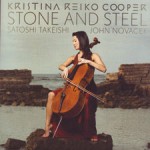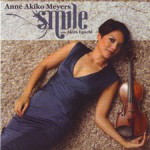Column Name
Title
Kristina Reiko Cooper: Stone and Steel (LINUS 270103)
Body
In her liner notes to her latest CD, Stone and Steel, cellist Kristina Reiko Cooper writes about living in Israel and its vibrant juxtaposition of the present and the past, which inspired this unusual hybrid of old and new. Cooper, who holds the Triple Crown of degrees—bachelor’s, master’s, and doctorate—from Juilliard, dives as far back as the 12th century, giving Baroque and Renaissance icons a confident, laid-back jazz makeover, nicely recorded by producer and engineer Tom Lazarus. With the help of Satoshi Takeishi on percussion and John Novacek on piano, she begins with two sober Henry Purcell pieces adapted by Patrick Zimmerli and Kenji Bunch. Much livelier music follows, with John Dowland’s George Whitehead’s Allemand and Flow My Tears, each still recognizable even after Zimmerli’s arrangements kick them into high gear, pumped full of syncopations and juicy percussion accents. The Gregorian chant Auctori Vite Psalmis finds Cooper sailing over a palette of shimmering piano, wind chimes, and bongos, and then John Novacek’s After Rameau gives the Baroque composer a quiet yet unmistakable Caribbean flavor.
A claustrophobic episode under Cooper’s house inspired Kenji Bunch’s Crawlspace (originally from 1996), for a restless cello “escaping” from extreme low pitches. Although Bunch—a Juilliard alum and faculty member—later arranged it for viola, this new version takes advantage of Takeishi and his crisp percussion improvisations. Hildegard von Bingen makes an appearance with Columbia Aspexit, which melds quiet meditation with upbeat solos for Novacek.
The title track, which Zimmerli wrote for Cooper, is a mix of grunge and sparkle that draws on everything from Gregorian chant to Brahms, with motifs that echo the other selections like 21st-century ghosts. It is a challenging vehicle, well-suited to show off Cooper’s virtuosity. At the end the opening Purcell track returns, this time in a different guise, with Zimmerli and Takeishi providing electronic drones and crackles as foils for Cooper’s melancholic intensity.
Anne Akiko Meyers: Smile (Koch 7762)
In this quietly entertaining confection, violinist Anne Akiko Meyers, who studied with Dorothy DeLay at Juilliard, carefully mixes well-gauged pop selections into a mostly classical menu. Her ardent collaborator is fellow alum and pianist Akira Eguchi, and both are lovingly recorded in the Purchase Performing Arts Center by Silas Brown.
Opening with Claus Ogerman’s velvety take on Charlie Chaplin’s “Smile,” Meyers and Eguchi are as relaxed as a walk on a summer day, as they begin an eclectic tour roaming from the early 19th century to the present day with substantial excursions in between. From 1974, Arvo Part’s sweetly minimal Spiegel im Spiegel (Mirror in Mirror) could be a touching prayer for peace, or an ode to falling snow, with Meyers’s long lines drifting over Eguchi’s slow-moving arpeggios.
Introducción al Ángel and Milonga en Re show the nostalgic side of composer Astor Piazzolla and his love of the tango, with Meyers deploying well-placed portamentos to help conjure up the Argentinean atmosphere. For some listeners the entire disc may be desirable for the first U.S. recording of a “new” Messiaen piece, his stark Fantaisie, written in 1933 for his first wife but lost until 2007, when it was discovered in Paris. In just under eight minutes, Meyers and Eguchi find themselves approaching rapture. Then the duo pull back for the gentle drama of Schubert’s Fantasy in C Major, the longest track and one of the high points of the program. Meyers’s long lines meld gracefully with Eguchi’s precision fingerwork, climaxing with a dazzling finale.
In a complete switch of gears, two traditional Japanese melodies follow. Meyers uses discreet ornaments to color Haru No Umi (“Sea in Spring”) by Michio Miyagi and Kojo no Tsuki (“Moonlight Over the Ruined Castle”), a bittersweet song by Rentaro Taki, with Eguchi’s glittering piano lines tumbling down like a waterfall. The disc ends with Makato Ozone’s arrangement of “Somewhere Over the Rainbow,” warmly written for the violin, contrasting with Eguchi’s cooler, jazz-inflected backdrop.






